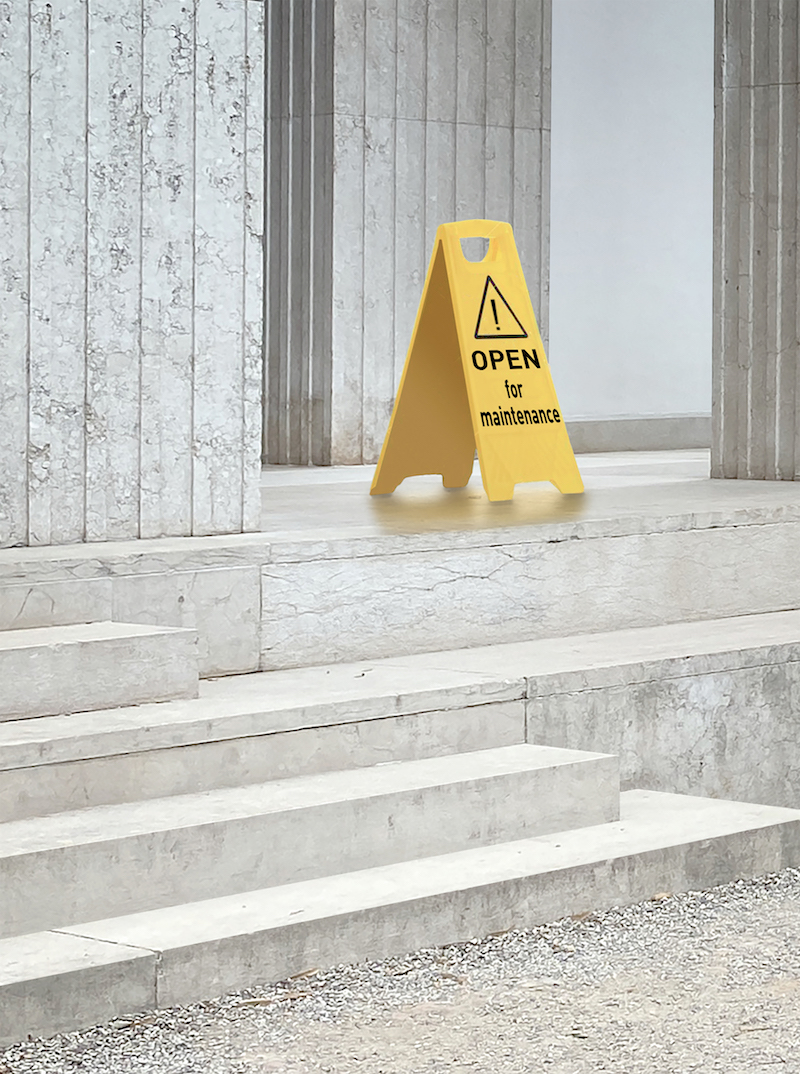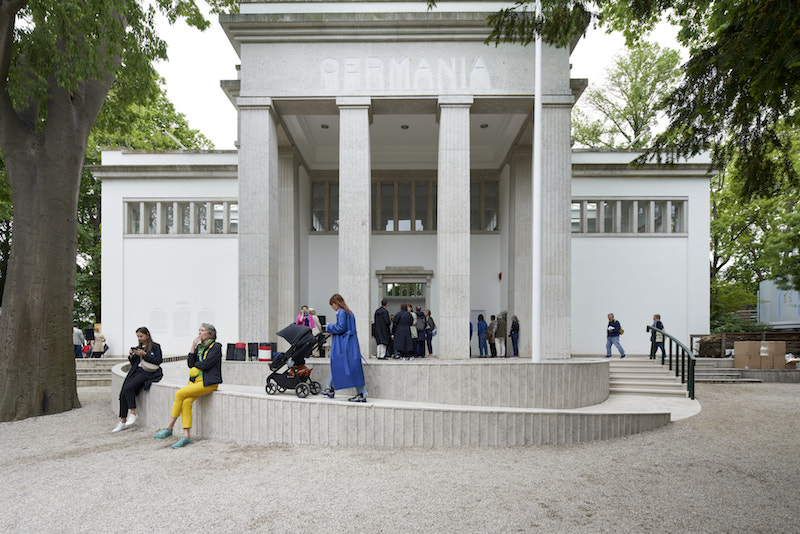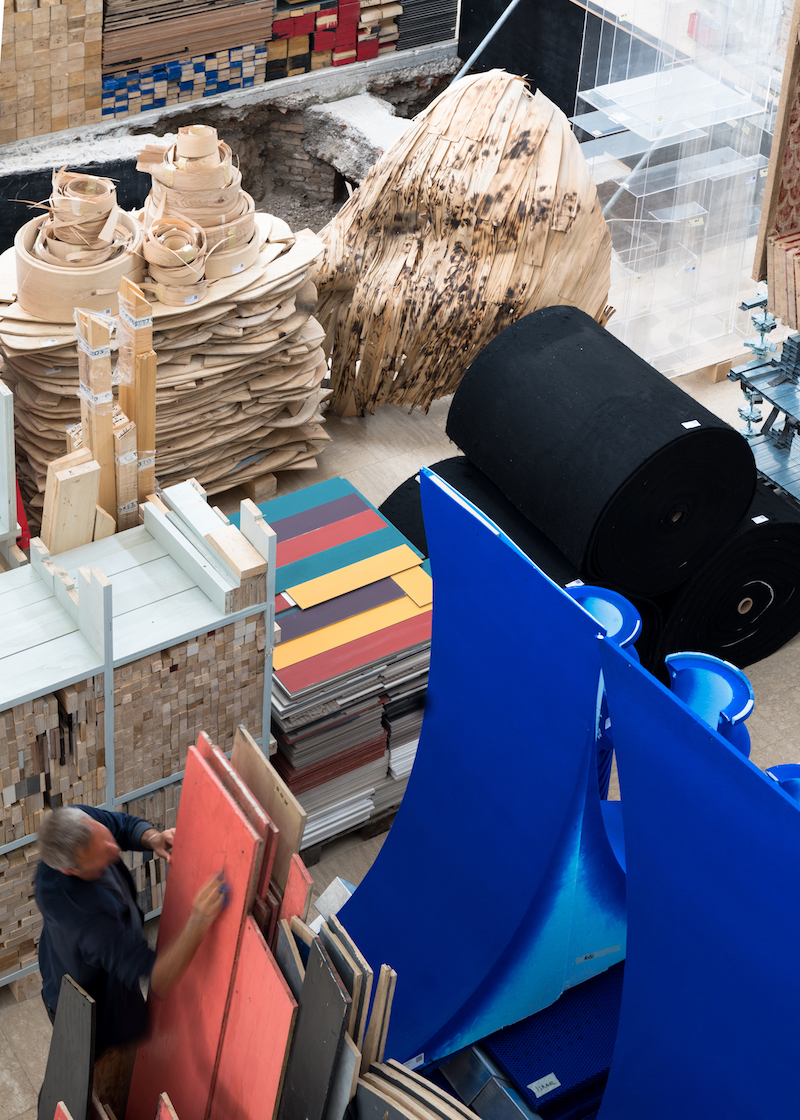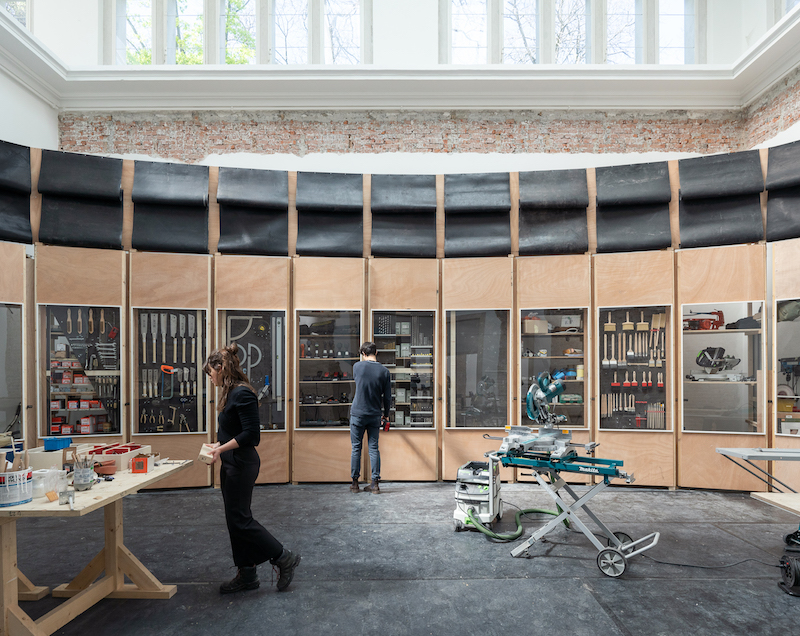by Aoife Donnellan // June 2, 2023
The 18th International Venice Architecture Biennale, ‘The Laboratory of The Future,’ sets itself apart from past iterations. The annual aim of the biennale is to question the history of architecture and the built environment while imagining a future for those disciplines. This year’s curator, Ghanaian-Scottish architect Lesley Lokko, utilised the main exhibitions in the Giardini and Arsenale to chart an optimistic view, while interrogating the requirements of biennale participation: “imagination and the means to display it.” Lokko continues, explaining that frequently “throughout the exhibition, the contrast between participants from countries with generational means and those without is stark.” These observations lay the foundation for a series of works that prioritise a dialogue between materiality, representation and transformation.

‘Open for Maintenance’ // © ARCH+, Summacumfemmer, Büro Juliane Greb
‘Open For Maintenance’ (2023), Germany’s contribution to the biennale, curated by ARCH+, Summacumfemmer and Büro Juliane Greb, primarily tackles the waste generated by exhibition-making at each year’s biennale. Everything in this year’s pavilion is built using materials from the Biennale of Art in 2022. The introductory text maintains that it “is not an exhibition” but “an action framework,” aimed at transforming existing building cultures that rely on the exploitation of resources and labour. Inspired by resource conservation practices from squatting communities in Berlin in the 1970s and 80s, the curators aimed to spark discussions about ecological sustainability’s links to social care and repair. This year’s curatorial team acted as stewards, keeping the pavilion in the condition it was given to them, while providing resources to visitors and a storage solution to national pavilions.
The action framework’s intentions are evident from the pavilion’s facade; the monumental and austere German pavilion has been transformed into a welcoming place of activity. Where previously there were five steps up to the entrance, now there is a wide, sloping ramp, topped with repurposed carpets rolled into stools. The shady space above the ramp has become a seating section to be used by the public for picnics, chatting or refuelling. There is a conspicuous lack of invigilators inside, furthering the feeling that audiences are welcome to actively participate. Maria Eichhorn’s ‘Relocating a Structure’ (2022), which was presented as part of Germany’s contribution to the exhibition in 2022, remains visible, as does her accompanying text and associated tours.

The new inclusive access ramp to the German Pavilion ‘Open for Maintenance,’ 2023 // © ARCH+, Summacumfemmer, Büro Juliane Greb
Inside the front door in the main room sits ‘The Material Repository,’ a collection of second-hand materials gathered from over 40 national pavilions and exhibitions at the 2022 Venice Art Biennale. This collection occurred in conjunction with the organisation Rebiennale/R3B who assist curators in constructing and deinstalling their exhibitions in order to prioritise the reuse of materials as well as arranging the community-oriented reuse of biennale waste. Stacks of marble tiles, wooden crates, ventilation grids and other exhibition materials challenge visitors to consider uses for them. Alongside the physical repository, there is a digital catalogue of the material to render it useful to workshop participants. This online inventory will be reused throughout the workshop series ‘Maintenance 1:1,’ a collaboration with professionals, students and local organisations. This gathering of material returns a sense of agency to past ideas and their material counterparts, providing them with an alternative future.

The German Pavilion as a Material Repository, ‘Open for Maintenance,’ 2023 // © ARCH+, Summacumfemmer, Büro Juliane Greb
A video work by Giovanna Silva entitled ‘Veritas (on Venice)’ (2022) is installed across five small screens behind the repository, showing how products arrive and waste departs from Venice. Yellow, blue and pink bags fill the back of various boats, as people operate heavy machinery under the summer sun. The effect is nauseating, as the constant swaying of boats flits across the screens.
The pavilion offers a number of facilities to visitors including a professional workshop space, a meeting space, a kitchenette and an ecological and gender neutral bathroom. In the professional workshop there are people mending and building objects from the material in the repository. The walls hold power tools, ear covers, industrial hoovers and workbenches, while the people work slowly, chatting with one another, repairing a variety of things. In the meeting space there is a game, ‘Trivial Circuit,’ created by LXSY Architekten and Impact Hub Berlin at CRCLR House in Neukölln, which teaches users about circular construction through gameplay. In the same space, Haus der Materialisierung, who practise climate-friendly resource usage, have created an independent bag manufacturing workshop where visitors can create textiles using fabric from the Art Biennale 2022.

The Workshop, ‘Open for Maintenance,’ 2023 // © ARCH+, Summacumfemmer, Büro Juliane Greb
‘Open For Maintenance’ engages directly with its subject, creating a space that is brimming with activity rather than awaiting passive exhibition viewing. Its curators answered Lokko’s call for “more than representation,” for a commitment to creating a functional future, where architects, researchers, artists, tradespeople and the public work together to preserve and sustain humanity as a whole.
Exhibition Info
La Biennale di Venezia
18th International Architecture Exhibition
ARCH+, Summacumfemmer, Büro Juliane Greb: ‘Open For Maintenance’
Exhibition: May 20–Nov. 26, 2023
Admission: € 25 (reduced € 20)
archplus.net
labiennale.org
Pavilion of Germany, Giardini della Biennale, 30010 Venezia VE, Italy, click here for map


























